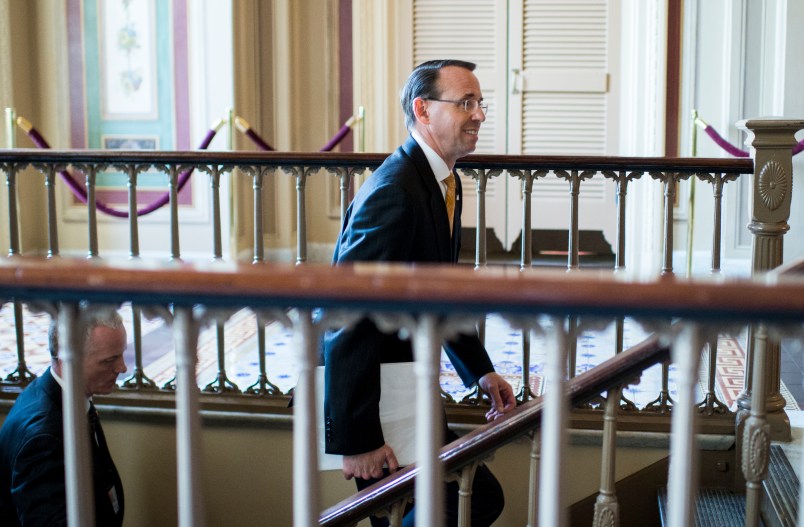Alice Ollstein contributed reporting.
Democrats participating in a full U.S. House of Representatives briefing with Deputy Attorney General Rod Rosenstein Friday morning asked about a dozen times whether he was pressured by the White House to write a memo that was then used to justify the firing of FBI Director James Comey—a memo Rosenstein is continuing to defend, even after confirming that he wrote it after President Trump declared his decision.
Rosenstein, according to members coming out of the classified briefing, wouldn’t say.
“What we didn’t get a clear understanding of is whether or not the memo was written with or without any urging from the White House,” Rep. G. K. Butterfield (D-NC) told reporters after the briefing.
Asked whether Rosenstein said if he received any pressure to come down hard on Comey, Rep. Sherman (D-CA) said, “He avoided at least 10 times any question that would answer your question.”
Rep. Dave Trott (R-MI) told the Associated Press that at one point in the closed-door meeting, Oversight Committee ranking member Rep. Elijah Cummings (D-MD) got up and asked: “So you just woke up one morning and decided to write a memo?”
Rosenstein’s reticence is frustrating many Democrats, even as they praised his decision to appoint former FBI Director Bob Mueller to serve as a special counsel on the Russia-Trump investigation.
“I still have a lot of questions about the motivation and timeframe” of the writing of the Comey memo, said Rep. Bonnie Watson Coleman (D-NJ) after the briefing.
Still unanswered, according to Rep. Jim McGovern (D-MA), were “the basic questions involving the memo he wrote for the president.”
“Basically, it’s nice he decided to come to up to the Hill but it would have been nicer if he had come up and wanted to tell us something,” McGovern told reporters.
Soon after the briefing, the Justice Department released the opening statement Rosenstein gave the House members as well as the Senate, whom he he briefed Thursday afternoon. In the statement, Rosenstein defended writing the memo, which criticized Comey for his handling of the Hillary Clinton email investigation.
“I wrote it. I believe it. I stand by it,” Rosenstein said in his statement, while calling Comey’s press conference on the results of the Clinton investigation “profoundly wrong and unfair.”
However, he also stressed that his memo should not be considered a “a legal brief,” “a finding of official misconduct,” “a statement of reasons to justify a for-cause termination,” “a survey of FBI morale or performance,” nor “a press release.”
“It is a candid internal memorandum about the FBI Director’s public statements concerning a high-profile criminal investigation,” his opening statement said.
Even though it was only May 8 that Trump officially declared his intention to fire Comey, according to Rosenstein’s opening statement, removing Comey from the post was something he discussed with Attorney General Jeff Sessions last winter, when Sessions was still a senator.
Coming out of their briefing Thursday afternoon, some senators suggested that Rosenstein wouldn’t say more about his decision to write the memo because he didn’t want to get in Mueller’s way, if that was where the investigation brought him
There was a least a hint of that being a factor when House Dems grilled him on Comey’s firing Friday morning.
“He basically said that the investigation will make that determination. Even if Special Counsel Mueller wants to investigate the circumstances surrounding the memo, he has that authority,” Butterfield said.







and now being reported - this was a decision months ago before Sessions and Rosenstein were in their current positions to figure out a way to get rid of Comey.
This is why Rosenstein stabbed Comey in the back!
This has been planned for months!
There is no decency about Rosenstein. He was just a low, very sleazy “hit man”! And, really needs to resign - in disgrace!
??? Rosenstein hired Mueller, a brilliant move. If he was pro Trump he would have appointed Guiliani or Christie. I actually can’t think of a better appointment than Mueller. Not only is he highly qualified and unbiased, but he is someone no Republican can trash.
I think Rosenstein was pressured big time. And if he does not write the memo, he is fired, and a new AG appointed by Trump either does not hire a Special Counsel, or hires a Christie type.
Rosenstein may have actually played this well.
NO NO NO. If he resigns, Trump can appoint a Deputy AG who will fire Mueller. As it is now, the only person who can fire Mueller is Rosenstein. You need to force Trump to fire Rosenstein, not let Trump get a freebie. Firing Rosenstein after he wrote a memo for you looks like…obstruction of justice. You need to force Trump to make the dick move, not make it easy for him.
Rep. Dave Trott (R-MI) told the Associated Press that at one point in the closed-door meeting, Oversight Committee ranking member Rep. Elijah Cummings (D-MD) got up and asked: “So you just woke up one morning and decided to write a memo?”
Don’t we all?
I get why Rosenstein needs to ‘dance’, but seeing how he’s taken Comey’s spot, he needs to be careful about how he ‘dances’.